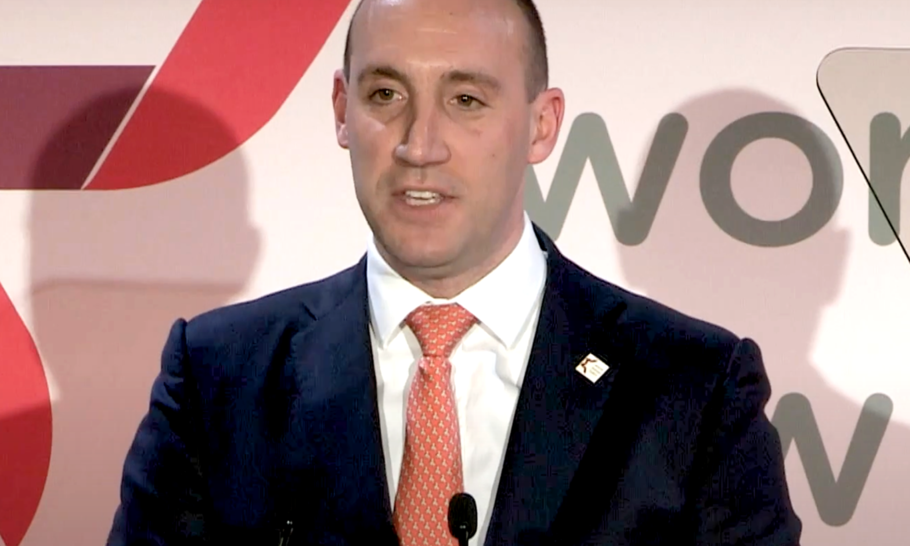Boris's new chief of staff gives him the opportunity to move on and look forward

Dan Rosenfield (World Jewish Relief/Youtube)
Slightly buried in last weeks papers, but too important to be missed, was the news of the appointment of a Chief of Staff at 10 Downing Street. Contrary to much media speculation, the role did not go to a serving politician, but to a more independent figure, Dan Rosenfield, a former well thought of senior civil servant currently experiencing life in the private sector, with a strong voluntary sector commitment also evident.
Amid the extraordinary background noise of current government, which no former minister envies, this appointment may represent a quiet turning point away from the past, and provide a change in mood which will be to the advantage of government and nation.
An MP in the role would not have been the better solution. No MP can possibly be independent of a whole slew of interests which would affect the mindset of a chief of staff. A sitting MP already has a role with a PM, the Parliamentary Private Secretary, which is far more appropriate. In recent times there have been quite excellent ones. For five years I was the PPS to a Cabinet Minister, Kenneth Baker, in the days when all PPS’s were personally attached to ministers, not to departments, and then for three years to the Leader of the Opposition, successively Iain Duncan Smith then Michael Howard. I think the personal relationship was the better system. The PPS role is not in the department, or in No.10. If the politician is competent, then Parliament is his or her environment, and picking up the feelings of colleagues, and being on transmit out, and crucially, listening in, is vital in order to give an honest reflection of current events and choices ahead to one’s principal. The PPS does not have to get caught up in departmental management issues and cross the line with the civil service.
A former politician can be chief of staff as Gavin Barwell demonstrated, but it is not for a sitting MP.
In present circumstances, there is even more need to reach back to the professional advisers – the civil servants who may be neutral in political terms, but are definitely not neutral when seeking to deliver the very best for the Government of the day, including fulfilling the political aims set out in a manifesto.
That there is any doubt about this, stems back to the appointment of senior Vote Leave figures into running the Government, with an avowed disdain of MPs and officials. I was among those who challenged this. Quite right to seek to avoid the issues which beset the end of Mrs May’s time, and ensure that all in Government were at one with wherever the Brexit talks would lead. But Government is not a campaign, and no matter how dominant any single issue, other events can take over, as the past year has amply demonstrated. By fashioning the Johnson Government almost exclusively around the past, it suggested a Government likely to be forever reaching back to fight the last war, rather than, as it must, be looking forward to fight the battles inevitably thrown up by being in Government.
Additionally, with the transition period post-Brexit to be resolved shortly one way or another, a ‘turning the corner’ moment was built in. Whatever the exact circumstances behind the recent personnel changes in No.10, that opportunity of change is now enhanced by the introduction of a fresh look at the top of professional administration. There is an immediate opportunity to demonstrate this in Parliament.
However unfairly, the current Cabinet is seen to be heavy on Brexit compliance with the PM, for the perfectly understandable reasons of recent political upheaval and the delivery of the election promises, but lighter on forging a new narrative for the future. Good people languish on the back benches. While those who know them well would never suggest a lack of generosity of spirit in the dismissed former advisers, their continued presence might have made it harder to resist the view that any failure to appoint former Cabinet ministers or prominent backbenchers and others to significant roles, resulted from a relentless refusal to move away from a Leaver/Remainer divide – to the detriment of good government. The new appointment, non-political, allows Downing Street to look forward, not back, and importantly, be seen to do so.
This Government, and Prime Minister, will be judged upon the next twelve months more than the last. Somehow it has to remind people that “levelling up” is not a zero-sum game between regions or politicians, but something which unites a country too geographically interdependent to be at permanent odds with itself, facing two challenges of a lifetime, recovery from Covid-19 and Brexit, at the same juncture. It’s not a bad time to restart.
A Message from TheArticle
We are the only publication that’s committed to covering every angle. We have an important contribution to make, one that’s needed now more than ever, and we need your help to continue publishing throughout the pandemic. So please, make a donation.




